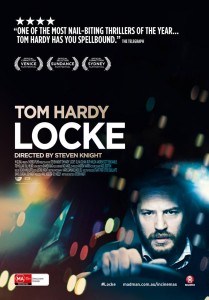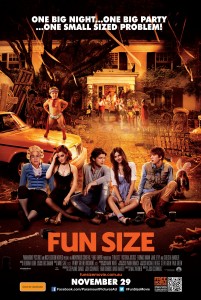 Constructing a building. Dismantling a life. These are the dual organizing principles of Steven Knight’s absorbing film Locke.
Constructing a building. Dismantling a life. These are the dual organizing principles of Steven Knight’s absorbing film Locke.
Ivan Locke (Tom Hardy) is a construction director. We meet him on the night before he’s to lead one of the biggest concrete pours in Europe’s history, laying the foundations for a 55 floor skyscraper that depends on perfectly calibrated concrete and zero room for error. We meet him as he is getting into his BMW to begin driving from his home in Birmingham to London. The motivations for this trip are slowly unwrapped, but it becomes clear, soon, that he’s taking a road trip at the most inconvenient time and that he’s trying to retain control over his life as its foundations crumble around him. As Locke observes, one little mistake is all it takes for it to all come crashing down.
It’s just him and his car and his phone. The phone (via Bluetooth) is the film’s major prop. Locke makes and accepts dozens of calls, as he takes care of business in both his personal and professional lives. The first call reveals a mistake he made several months ago, the consequences of which he will now have to deal with. Other calls reveal that Locke is married with two sons, Eddie and Sean, and that he’s troubled by his own father’s neglect when he was a boy. Revealing information at a realistic pace through this conversational device, Knight’s script shows us that Locke wants to be an involved dad and a dependable husband to his wife of 15 years, Katrina (Ruth Wilson). It’s also clear that he loves concrete and building structures that “steal the sky” – he is committed to the next day’s epic pour even though he’ll probably be in London when it’s happening. But for now, all he can do is drive.
Knight (best known for his smart screenplays for Dirty Pretty Things and Eastern Promises) provides a simple enough premise – a man’s life changes irrevocably because of one blunder. But it’s the film’s execution that makes it something quite extraordinary. It unfolds almost exclusively inside that BMW, at night, and with no face but Hardy’s to engage with for the film’s entire running time. 
Through this set up Locke exposes a key narrative tension between entrapment and freedom. With an almost mesmeric rhythm, Locke travels down the motorway, as he says, in “one direction”. He’s a man who’s accustomed to being in control – on this night, even though he’s steering the wheel, he’s not the only driver of his destiny. Locke believes that there are “practical steps” that can be taken to solve any problem. In a desperate moment he tells one of his sons, “I’ll fix it and it will all go back to normal” because he needs to believe this as much as he needs his family to.
Knight shot Locke like a piece of theatre – filming the entire script, from start to finish, twice a night. The disembodied actors – the voices Hardy speaks to on the phone – were all positioned in a hotel room, talking to him live. No stopping and no retakes. In the end, Knight had sixteen different versions of the same film to work with. This innovative technique gives Locke both a sense of immediacy and intimacy. Locke is rich with close ups on Hardy’s compelling face, shot at a variety of angles, framed both by the camera and the structured space of the car. Knight’s camera occasionally journeys outside to the road ahead, but for the most part we are in the car with Locke. Knight doesn’t give either him or us much room to move. And yet it’s the opposite of oppressive and gimmicky. Here is character psychology writ large in setting and mise-en-scène. If Locke is trapped – not only in his car but also in an existential drama – he at least acknowledges that the situation is of his own making, as he repeats, “I have chosen this”.
Hardy is an immensely charismatic actor, one of those actors your eyes always follow when he’s sharing screen time with others; when he’s alone he’s all the more fascinating. In Locke he gives a performance constructed around his ability to express rage and sadness with equal intensity, all delivered in a rich Welsh brogue that lends him both softness and authority. On paper, asking an audience to invest everything in just one character sounds like an insurmountable challenge, especially for contemporary cinemagoers, who seem increasingly unfocussed. But in the end Locke is a successful experiment and Tom Hardy’s candid, textured performance the concrete holding it all together.
Locke is in Australian cinemas from 28 August through Madman Entertainment.






1 Comment